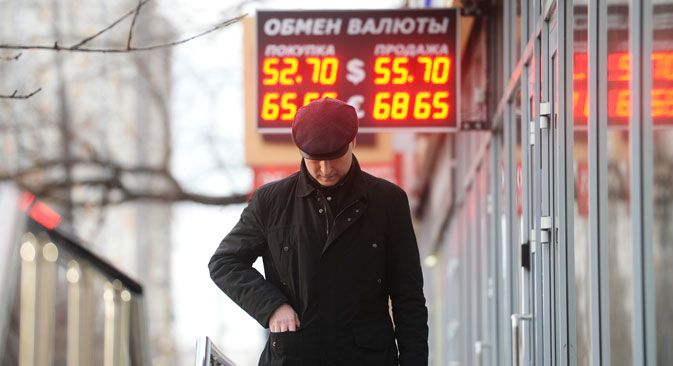
According to the Ministry of Economic Development, Russia will fall in rececction in 2015. Source: Kirill Kalinnikov / RIA Novosti
Reading some western media outlets, you’d think Russia’s economic sky has fallen in as a result of sanctions imposed by NATO and the EU this year. The US driven strategy, which primarily targeted the military and finance sectors has, along with a falling oil price, devastated the rouble. The Kremlin responded by banning many western agricultural products, which has helped to create food price inflation across Russia.
However, some of the press coverage has been so ridiculously overblown that casual consumers could be fooled into thinking that starving urchins are stalking Moscow's Arbat.
From the perspective of elements in the Russian media, it’s the reverse: Europe is suffering from Moscow’s counter sanctions. The Dutch are having frenzied tomato fights in protest and Spanish farmers are as mad as hornets. Meanwhile in Moscow, locals are roasting fattened pigs in nightly defiance.
Middle ground
In such matters, the truth is usually somewhere in the middle. However, the only way to know for sure is to ask. To ignore those with vested political interests in spinning their viewpoint, and instead to query ordinary members of the public who are, blamelessly, caught in the crossfire.
Too much Russia coverage is focused on Moscow, despite the fact that the metro-area accounts for only about 12 percent of the country’s population. With this in mind, RBTH decided to start in far eastern Vladivostok by speaking to Sergei Kostin, a 33-year-old computer programmer.
Far from Europe, you’d think the city, which lies on the Sea of Japan, would suffer less than Russia’s western regions. However, the economic boom of the last decade opened up the remote market to EU food products and many have become used to, if not reliant, on them. The notion that Far Easterners survive by hunting bears and tigers is pretty far from the truth; pizza and pasta are rather more common.
It’s annoying “not being able to buy certain cheeses and other European food in the shops. The Chinese, or it could have been our local middlemen, have wised up very quickly and pushed up prices," Sergei says.
Travel and wages have also been affected, he adds.
“I visited Ireland recently for English language lessons and it felt much more expensive than the last time I went there a year ago. That’s because the rouble has fallen a lot against the euro.
“There is a feeling that wages are being hurt. In an international field like IT, you are always comparing your salary to those in other countries. I was already behind an equivalent specialist in Dublin or Berlin. It makes emigration more attractive and I’ve had some offers,” he confides.
North face
In St Petersburg, on the opposite frontier of the vast country, Kristina Zakharova, 24, has had a similar experience. The customs clearance manager has a privileged vantage point from which to survey the fiscal wreckage.
“Imports and exports have fallen significantly. Some companies are going bankrupt," she says. "I can also say that many traders are holding off right now waiting to see if the situation changes.”
Kristina has also been forced to amend her shopping habits. “I cannot afford to buy many goods in foreign online stores because of the weak rouble. Other products I used to use have disappeared from the shelves and air travel is too expensive now.”
Ludmilla Popova, a 28-year-old entrepreneur from the city, has an entirely different perspective. She feels that people are fretting too much about the economic ill-winds. “I never pay attention to prices. Just because bread costs 100 roubles and not 98, I am not going to stop eating it. So I just buy it and that’s that. To be honest, I also don’t know the price of fuel for my car!”
Nevertheless, in her professional life things are a little different. “I pay for my stock in euros and I need to transfer roubles so, yes, that is now more expensive. Luckily, I did a lot of transfers almost a year ago. I foresaw this situation when Ukraine first entered the news so I am okay. I think all you need to do is ‘feel’ before something happens and I ‘felt’ that Ukraine would lead to a big crisis,” she says.
Capital trends
Moscow’s Christina Ermakova, 29, has encountered negatives in her work as an analyst. “It’s very obvious that our clients have cut their marketing budgets. Marketing and advertising are usually the first things to be reduced in a recession so I think it’s a sign.
“It has influenced my New Year’s vacation. I wanted to go to Europe but it’s too expensive. I am looking at more reasonably priced locations now. Maybe Turkey or someplace in Asia.”
Walter Bisoffi, 45, an executive chef at Probka, a high-end Italian restaurant in Moscow, says: "The embargo has led to an increase in the price of products made in Russia and a considerable increase in the selling price of goods that were imported and kept in storage.”
It has, he adds, created challenges in the kitchen.
“All this has created an increase in the cost of dishes at the restaurant. It’s a small battle everyday, but that’s good - it keeps me young,” he jokes.
It’s clear that Russia is now suffering from ill winds. The country largely avoided the punishment that most of Europe has endured since the 2008 crash and austerity is an unknown concept to the youth.
If the rouble doesn’t recover soon and if sanctions are made permanent there will be even more serious costs for the Russian people.
All rights reserved by Rossiyskaya Gazeta.
Subscribe
to our newsletter!
Get the week's best stories straight to your inbox